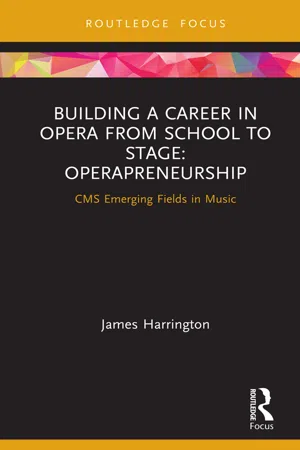
Building a Career in Opera from School to Stage: Operapreneurship
CMS Emerging Fields in Music
- 154 pages
- English
- ePUB (mobile friendly)
- Available on iOS & Android
Building a Career in Opera from School to Stage: Operapreneurship
CMS Emerging Fields in Music
About this book
Building a Career in Opera from School to Stage: Operapreneurship provides early-career singers with an overview of the structure of the opera industry and tools for strategically approaching a career within it. Today's voice students leave the conservatory with better training than ever, but often face challenges to managing their own careers after graduation. This book addresses what singers need to know in order to craft a career path in the contemporary landscape of opera.
Readers learn about the opera industry's structure, common pathways and entry points, non-academic training programs, researching and evaluating opportunities, crafting professional documents and media, and what it means to be a professional opera singer. Written by a singer with recent experience in the industry—and particularly the emerging phase—this book is a practical guide for all singers embarking on a career in opera.
The author's website, www.OperaCareers.com, hosts additional resources including databases of training programs, guides and templates for creating professional documents, as well as articles addressing current industry issues and interviews with subject matter experts.
Frequently asked questions
- Essential is ideal for learners and professionals who enjoy exploring a wide range of subjects. Access the Essential Library with 800,000+ trusted titles and best-sellers across business, personal growth, and the humanities. Includes unlimited reading time and Standard Read Aloud voice.
- Complete: Perfect for advanced learners and researchers needing full, unrestricted access. Unlock 1.4M+ books across hundreds of subjects, including academic and specialized titles. The Complete Plan also includes advanced features like Premium Read Aloud and Research Assistant.
Please note we cannot support devices running on iOS 13 and Android 7 or earlier. Learn more about using the app.
Information
1Opera Companies
Terminology
Tier 1/2/3/4/5 House
| Tier | Budget | # of OA Professional Companies (2020) |
1 | >$15 million/year | 11 |
2 | $3–15 million/year | 26 |
3 | $1–3 million/year | 25 |
4 | $250K–1 million/year | 53 |
5 | <$250K/year | 27 |
A/B/C/D House1
International/Regional/Vanity
People/Organizational Chart
Artistic Director
Musical Director
Executive Director
General Director
Director of Artistic Administration (also Artistic Administrator)
Education Director/Studio Manager
Summary of Key Principles
Application Questions
Table of contents
- Cover
- Half Title
- Series Information
- Title Page
- Copyright Page
- Dedication
- Table of Contents
- Series Editor’s Introduction
- Figures
- Tables
- Acknowledgements
- Introduction
- Part I The Industry from 30,000 Feet
- Part II How a Young Singer Prepares
- Part III The Nuts and Bolts of Booking Work
- Glossary of Terms and Entities
- Index